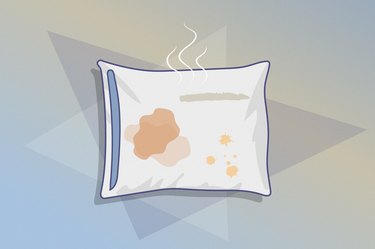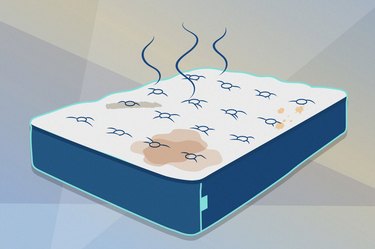
Washing a big, bulky comforter or duvet takes more work than washing your sheets. So if you're sleeping with a barrier sheet, is regular laundering even all that necessary?
Experts say yes. You don't necessarily have to wash your comforter or duvet as often as you wash your sheets (which should happen once a week, for the record). But going too long without cleaning them can potentially worsen certain health problems and affect your sleep. In some cases, it might even be the hidden cause of those pesky breakouts.
Video of the Day
Video of the Day
Here's how often you actually need to toss that top blanket into the wash. Plus, whether it's OK to wash your comforter or duvet at home.
Possible Side Effects of a Dirty Comforter or Duvet
So, what exactly can happen when your big blanket stays unwashed on your bed for a long stretch? According to experts, here are two big concerns to consider.
1. Exposure to Allergens or Dust Mites Could Affect Your Sleep
Going for long stretches without washing your comforter or duvet means there's more time for dust mites — those microscopic critters that feed on dead skin cells — to accumulate in your bed, says Jeanne Lomas, DO, director of Allergy & Immunology at WellNow Allergy.
If you're among the 20 million Americans with a dust mite allergy, that could mean your sleep space is triggering symptoms like sneezing, watery or itchy eyes, congestion, postnasal drip or coughing, per the National Library of Medicine.
If you have asthma on top of a dust mite allergy, you might also experience wheezing or chest tightness.
Other allergens can build up in the fibers of your unwashed comforter or duvet too. Think: dander from a pet that likes to hop on your bed, or pollen tracked in from your clothing or shoes, Dr. Lomas says.
These symptoms can, unsurprisingly, make it harder to get a good night's rest and can make you more prone to feeling sleepy during the day, suggests a March 2022 study in Allergy, Asthma & Clinical Immunology.
You might also notice you feel particularly bad in the morning. "Symptoms may be worst first thing in the morning if you have been inhaling the allergen all night long," Dr. Lomas says.
2. You Could Get Breakouts
Even if you don't have allergies, not regularly washing your comforter or duvet might cause problems for your skin.
"There can be a buildup of sweat, bacteria and dirt that can lead to clogged pores and sensitivity," says Marisa Garshick, MD, assistant clinical professor of dermatology at Cornell – New York Presbyterian Medical Center.
That's especially true if you often go to sleep with makeup on or without washing your face, or if you get into bed when you're sweaty, she adds.
So if you're noticing an uptick in breakouts, your bedding could be a contributing factor.
How Often to Wash Your Comforter or Duvet
The right frequency depends on the type of blanket you're using. Duvet covers typically need to be washed more often than comforters or duvet inserts because they're often used without a barrier sheet and come in more direct contact with your skin. In that case, it makes sense to wash the duvet once a week along with your sheets and pillowcases, recommends the Asthma and Allergy Foundation of America (AAFA).
If you're using a comforter with a barrier sheet underneath, you can get away with washing it less often. Recommendations range from every month or two to a few times a year.
"It really depends on the person," Dr. Loma says. "Some people may be highly sensitive to just a small amount of allergen, while others can go weeks without washing bedclothes and have no symptoms at all."
How to Wash Your Comforter or Duvet
The best way to wash your bedding is by following the manufacturer instructions on the label. Most of the time, it's OK to wash a comforter or duvet in your washer and dryer at home with regular detergent, as long as the item isn't dry-clean only, according to Maytag. (That's even true for comforters filled with down.)
If you have a standard-size washer or dryer, it should be able to accommodate your blanket.
Make sure to wash your comforter or duvet in hot (130 degrees F or higher) water in order to kill off the dust mites, the AAFA recommends.
Drying the bedding on high heat is ideal to get rid of any lingering allergens, points out Dr. Lomas. But low heat will be gentler on the fabric and may preserve the life of your blanket.
Use a bulky setting if your dryer has one, which will help large comforters and duvets dry more evenly, Maytag recommends.
So, How Bad Is It Really to Never Wash Your Comforter or Duvet?
Not every single person will experience negative effects from not washing their comforter or duvet, say Dr. Lomas and Dr. Garshick.
But if you've got allergies or asthma, or your skin seems to be prone to sensitivity or breakouts, sleeping with unwashed blankets could make the problem worse.
- National Library of Medicine: "Dust Mite Allergy"
- Allergy, Asthma & Clinical Immunology: "Allergy-related outcomes and sleep-related disorders in adults: a cross-sectional study based on NHANES 2005–2006"
- Asthma and Allergy Foundation of America: "Dust Mite Allergy"
- Maytag: "HOW TO WASH & DRY A COMFORTER IN 8 STEPS"
Is this an emergency? If you are experiencing serious medical symptoms, please see the National Library of Medicine’s list of signs you need emergency medical attention or call 911.



